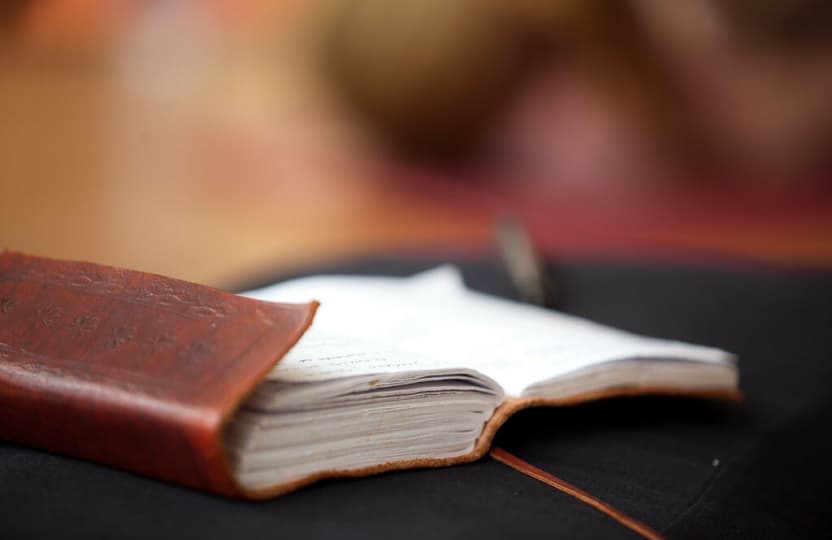
Taming the “Monkey Mind” Through Journaling and Mindfulness
Share
Enjoy this monthly mindfulness post from Dave Johnson, PhD, RN, LMFT.
A few years back, I was involved in a near miss auto accident that I will never forget. I was driving my Fiat near downtown when a large stray dog ran out in front of my car. A young man in a Hummer was coming toward me a bit fast and decided to avoid the dog by switching to my lane. (Did I mention he was bigger than me … and going fast?) Fortunately, I noticed what he was doing and instinctively took my car to the sidewalk to avoid a head-on collision. What I didn’t notice in my peripheral vision was a young mother out walking her baby in a stroller on that same sidewalk. Thankfully, she was not distracted and, upon seeing my car approaching, she instinctively pushed the stroller and baby into a bush. We all paused. We all made eye contact. We were all safe, including the darn dog!
As I recounted my tense tale to my wife, friends, colleagues and attendees at my Stress Relief Mindful Meditation class at the Center for Healthy Living (as well as anyone else who would listen), I noticed that the stress response was similar to the day of the event. My heart would beat a bit faster, I felt anxious and stirred up emotionally, and I had an overwhelming sense of gratitude that no one was hurt. The pictures were vivid in my head – the exact location where the incident took place, the eyes of the on-coming driver, and of course the anxious, resilient, ever-present mother and her baby.
Often, stress events in our lives don’t end in such a positive outcome. And when we relive the pain over and over again we activate stress hormones that continue to impact our physical, emotional and spiritual well-being. Processing our feelings with a kind, compassionate friend, counselor, minister or family member can be helpful, but sometimes we just can’t break out of this ruminating state. We can’t stop thinking about the traumatizing event(s) of our lives. And so, as a therapist, I often talk about the “monkey mind” of stress, whereby we become entangled, swinging from branch to branch in our brain. It feels challenging just to sleep, eat, work or engage in life to the fullest because of the painful thoughts and pictures we encounter deep within our thinking and overthinking mind.
In addition to counseling and encouraging a mindfulness-based meditation practice for relieving stress, I often encourage folks to write in a journal to help them cope with life events. Journaling is an intentional pause to reflect on insights and life lessons through writing. This process is a way of sorting through and making a bit more concrete those thoughts or behaviors which can be elusive, confusing, emotionally overwhelming or a trigger for going on autopilot (stuck in the monkey mind). When we connect the journal with mindfulness, this multi-sensory writing experience illuminates and makes more tangible life’s transforming experiences (pain, loss, grief, fear, love, joy, gratitude, serendipity, serenity, etc.) and assists in promoting more intentional presence in everyday living.
We sometimes use journaling to process our pain but often journaling can enhance our health by connecting insights of life’s lessons along the way.
Here are my tips for getting started with the journaling process.
Ensure privacy. A journal is for your eyes only. Be sure to keep it somewhere safe, away from those who you don’t wish to have see it.
Flow write. If you are uncertain about what to write, consider just getting the pen moving across your page.
Don’t judge it. Sometimes writing about our thinking and overthinking brain can help us after we write by putting those worries and thoughts on a “shelf” and giving us a rest.
Consider the environment. Sometimes a calm, safe space with a candle, incense or music playing is nice. Sometimes a park bench or a church pew is great. The main thing is to write and for many of us, just get started.
Date your entries. You will want to review your writing sometime in the future and knowing when you wrote these thoughts may be of interest to you.
It doesn’t need to be daily. You don’t want to create a compulsive habit. Save your writing for times when life is stressful or when you have life lessons you don’t want to forget. Last year I think I personally only journaled three times. The year before that, I journaled almost weekly.
Journal gratitude. Be sure to occasionally review your life and all the folks and aspects that you are grateful for. These entries help us to heighten our awareness of life. We write to taste life twice, in the moment and in retrospection.
Consider color. Try using colored pens, pencils or markers. Especially when you re-read what you wrote sometime in the future and a question, insight or emotion evokes. Jot them down in the margin.
Relax. Take a deep breath. Pray, meditate or find yourself just noticing using all of your senses (touch, taste, smell, etc).